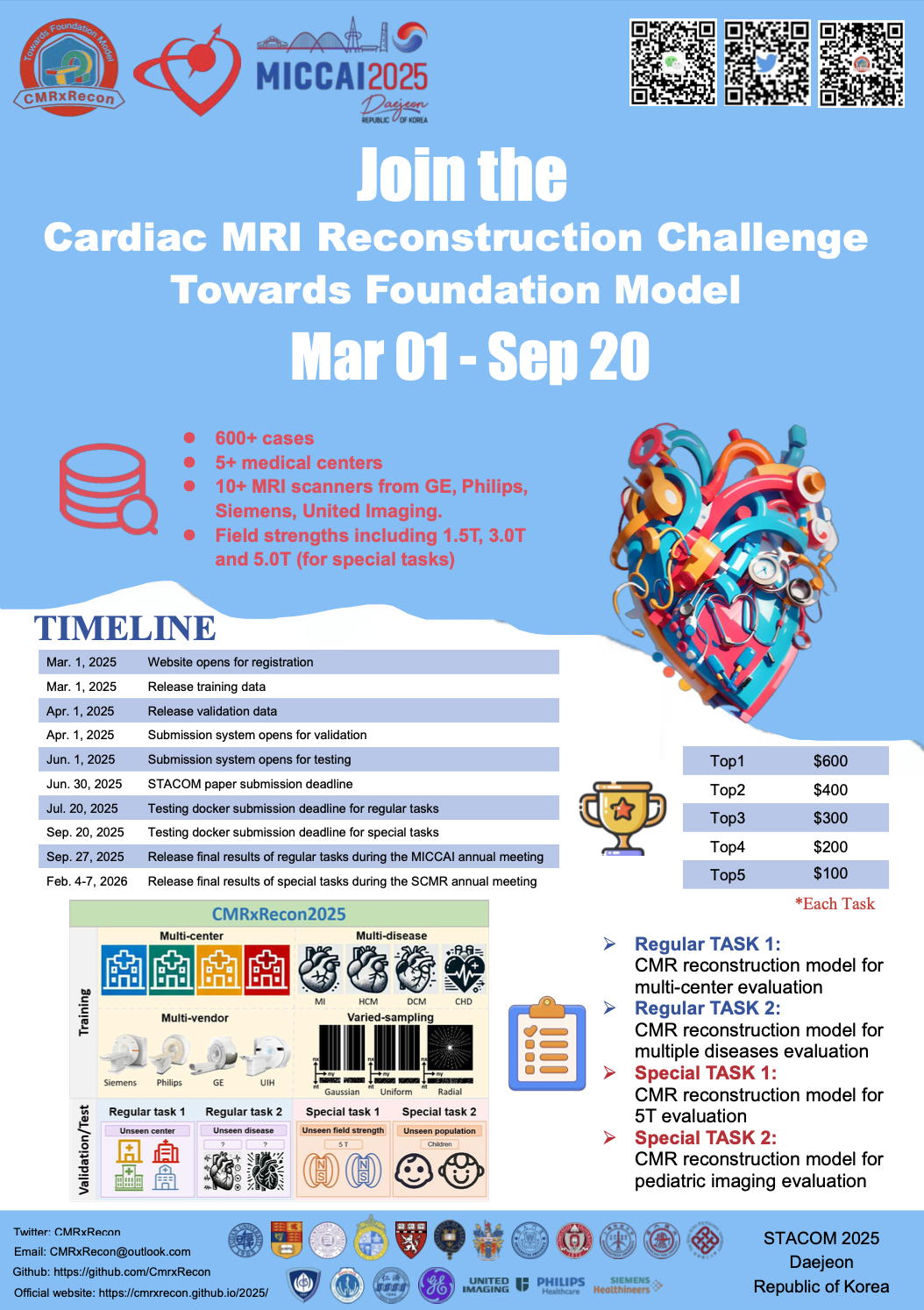The Statistical Atlases and Computational Modeling of the Heart (STACOM) workshop has been running annually at MICCAI since 2010. The 16th edition of STACOM workshop is going to be held in conjunction with the MICCAI 2025 in Daejeon, Republic of Korea. The STACOM workshop is aiming to create a collaborative forum for young/senior researchers (engineers, biophysicists, mathematicians) and clinicians, working on: statistical analysis of cardiac morphology and dynamics, computational modelling of the heart and fluid dynamics, data/models sharing, personalisation of cardiac electro-mechanical models, quantitative image analysis and translational methods into clinical practice.
Awards
Congratulations to Paula Casademunt from Universiteit Pompeu Fabra, Spain, for receiving Best Oral Presentation for his paper:
Casademunt, P., Morales, X., Elsayed, A., Zhao, D., Loncaric, F., Quill, G., Ramos, M., Doltra, A., Sitges, M., Lowe, B., Young, A., Nash, M., and Camara, O.
and to Irene Mancebo-Laguna from Universidad Carlos III de Madrid, Spain, for receiving Best Poster Presentation for his paper:
Mancebo-Laguna, I., Alonso P.Á., Sánchez, R.G., Pérez, M.M., Gómez, M.A., Carta-Bergaz, A., Atienza, F., Arenal, Á., and Ríos-Muñoz G.R.
Keynote speaker
Hyun Jin Kim, Associate Professor at the Department of Mechanical Engineering at the Korea Advanced Institute of Science and Technology
Title: Biomechanics modeling enhanced by AI
Abstract: Image-based modeling of the cardiovascular system has advanced significantly over the past few decades and is now widely used as a diagnostic, evaluative, and predictive tool for cardiovascular diseases. However, achieving full personalization in image-based models remains challenging due to the high uncertainty associated with many biomechanical parameters. While invasive measurements are typically used, the limited availability of such data often necessitates the use of physics- or data-driven methods. In this talk, I will provide an overview of image-based modeling approaches with a focus on coronary artery disease, highlighting efforts to personalize model parameters and account for their uncertainties.
Short bio: Hyun Jin Kim is an associate professor in the Department of Mechanical Engineering at the Korea Advanced Institute of Science and Technology. Prior to joining KAIST, she worked for a decade as a senior research engineer at HeartFlow, Inc., where she developed software for diagnosing coronary artery disease and assessing the rupture risk of coronary plaques. Her research currently focuses on advancing a variety of computational methods to assess the severity of cardiovascular diseases, predict disease progression, and evaluate medical devices using mechanics- and data-driven approaches.
Morning Schedule
| 08:00-08:10 | Welcome |
| 08:10-08:45 | Keynote: Biomechanics modeling enhanced by AI Associate Professor Hyun Jin Kim, KAIST |
| Oral Session 1 | |
| 08:45-09:00 | Active Learning for Deep Learning-Based Hemodynamic Parameter Estimation Rygiel, P., Suk, J., Yeung, K., Brune, C., Wolterink, J. |
| 09:00-09:15 | LGESynthNet: Controlled Scar Synthesis for Improved Scar Segmentation in Cardiac LGE-MRI Imaging Jacob, A., Sharma, P., Rueckert, D. |
| 09:15-09:30 | A comprehensive Pipeline for Aortic Segmentation and Shape Analysis Shehata, N., Elsawy, A., Nagy, M., ElMahdy, M., Ali, M., Romeih, S., Aguib, H., Yacoub, M., Glocker, B. |
| 09:30-09:45 | Fast multi-label parameterization of the left atrium by learned template morphing Castaneda, E., Raghunath, A., Meister, F., Weiss, M., Mihalef, V., Ashikaga, H., Maier, A., Passerini, T., Lluch, È. |
| 09:45-10:00 | Groupwise Registration with Physics-Informed Test-Time Adaptation on Multi-parametric Cardiac MRI Li, X., Zhang, Y., Huang, L., Chang, H., Niendorf, T., Ku, M., Tao, Q., Yang, H. |
| 10:00-10:30 | Coffee break |
| Oral Session 2 | |
| 10:30-10:45 | Comprehensive 4D flow MRI characterization of left atrial hemodynamic flow components in hypertension and hypertrophic cardiomyopathy Casademunt, P., Morales, X., Elsayed, A., Zhao, D., Loncaric, F., Quill, G., Ramos, M., Doltra, A., Sitges, M., Lowe, B., Young, A., Nash, M., Camara, O. |
| 10:45-11:15 | Poster teaser |
| 11:15-12:15 | Poster session (see list of accepted papers) |
| 12:15-12:30 | Closing |
CMRxRecon2025 Challenge
The objective of establishing the CMRx series challenges is to provide a benchmark that enables the research community to contribute to the work of accelerated CMR imaging with universal approaches that allow more diverse applications and better performance in real-world deployment in various environments. The previous CMRxRecon2023 and CMRxRecon2024 dataset did not cover multi-center, multi-vendor, and multiple diseases. Therefore, this year we aim to make an important leap towards real-world clinical scenarios.
For more information to join the challenge: click here
Afternoon Schedule
| 16:00-16:05 | Welcome |
| 16:05-16:25 | Keynote Thomas Kuestner - University Hospital of Tuebingen |
| 16:25-16:40 | Summary of the CMRxRecon2025 challenge Chengyan Wang - Fudan University |
| 16:40-17:00 | Award Ceremony |
| 17:00-17:40 | Oral session Moderator: Chen Qin - Imperial College London |
| 17:00-17:10 | Towards Foundation Model for MRI Recon Pengfei Guo, NVIDIA Corporation |
| 17:10-17:20 | Rethinking Parameter Tuning for Accelerated MRI Reconstruction Junzhou Chen, Cedars-Sinai Medical Center |
| 17:20-17:30 | HierAdaptMR: Cross-Center Cardiac MRI Reconstruction with Hierarchical Feature Adapters Ruru Xu, Istanbul Technical University |
| 17:30-17:40 | GENRE-CMR: Generalizable Deep Learning for Diverse Multi-Domain Cardiac MRI Reconstruction Kian Anvari Hamedani, University of Toronto |
| 17:40-17:50 | Introduction for CMRx4dFlow2026 challenge Chen Qin, Imperial College London |
| 17:50-18:00 | Closing |



